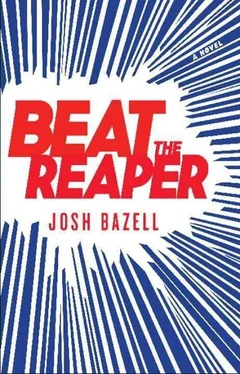On the way back to their truck, completely freaked out, one of the plumbers looked in through Karcher’s office window and saw what he believed was a rack, like from a medieval torture chamber.
The crew was so bothered by the whole thing that they almost called the cops. Then their training kicked in, and they passed the information up the mob line instead, where it eventually reached Locano. If you believed Locano’s story—which I must very much have wanted to do—this was the first time anyone realized what the Karchers were doing, even though the Farm had been supplying prime product for almost two years.
Not that it mattered. The mob now wanted Karcher dead, either because someone who really had been ignorant now wasn’t, and objected, or else because someone had decided that any operation that could be discovered by a vanful of consistently stoned plumbers was probably riskier than it was worth.
Whatever the case, Locano had quickly decided that this was the job for me to walk Skinflick through. He’d had the plumbing guys go back to the house to finish the pipes, but had them use cardboard instead of drywall to edge off the hole between the house and the new shack.
According to the plumbers, they had covered the cardboard with wax paper before painting it to keep it from warping, and the patch was so low to the ground, and so impossible to see from inside the house, that the Karchers had basically no chance of discovering it. Once Skinflick and I got into the shack, it would be a simple matter to tunnel through the wall and go shoot Les Karcher and his sons in their sleep.
Locano even had a plan to get us to the shack. For five grand and a leg up in the organization, the kid who delivered the Karchers’ huge grocery order every week was willing to take us in the back of his pickup truck. Both this kid and the plumbers reported that there weren’t any dogs on the premises.
How I came to sign on to this plan—the first I’d ever followed that came from someone else, or even involved someone else, or that anyone else even knew about, and which had so many variables about which I myself knew so little—remains something of a mystery to me. When I recall that time now, it seems like my mind was fogged. Though maybe it’s my memory that’s off.
I wanted Magdalena and I wanted out. And I knew both would require a sacrifice. I also hated myself pretty significantly, and understood that freedom, let alone Magdalena, were things I could in no sense claim to deserve.
Or maybe it was that I still trusted David Locano—if not in his intentions toward me, then in his intelligence and protectiveness toward Skinflick. I had to believe that no one with Locano’s amount of experience would lead the two of us into a situation that was fucked.
Let alone one as fucked as the Farm turned out to be.
I told Magdalena everything.
I had to. Watching her love me without really knowing me was like watching her love someone else, and the jealousy was killing me. I fantasized all the time about having a different life, and past. About actually being just some garbage scumbag, even.
But that wasn’t reality. So I told her. Even though the thought that she might leave me was fucking awful.
She didn’t leave me. She cried for hours and kept making me tell her over and over again about the people I had killed. How evil they were, and how likely they were to kill again. Like she was searching for permission to keep loving me.
Part of what I told her was that I was going to kill the man and his two sons who ran the Farm, then never kill anyone again unless they threatened her . Shutting down the Farm would be a favor to Locano that would smooth my way out of the business. And it would be justified by the lives it would save.
“Can’t you just call the police?” she said.
“No,” I said, with more certainty than I felt.
“Then you have to do it right away,” Magdalena said.
I thought she meant she needed me to get it over with so she could stop sharing me with the Devil, and start working on trying to forgive me.
“To keep any more girls from dying,” she said.
That may be the most shameful part of it. Not that I felt I couldn’t betray David Locano’s “trust” by calling the police. But that it hadn’t yet occurred to me that each passing day was a day in hell for the girls I was supposedly about to rescue.
It shows something, though: if you’re going to be soulless, you should at least consider outsourcing your conscience to someone else.
“It has to be a Thursday,” I said. “That’s the Karchers’ grocery day.”
Magdalena just looked at me. Thursday was four days off. Not nearly enough time to get ready.
Another rule broken. Another step taken into fog. Another among many.
“I’ll move it to this Thursday,” I said.
A couple of nurses and the anesthesiologist and I use Squillante’s bedsheet to lift him from his wheelable bed to the fixed table in the center of the operating room. It’s not that he weighs anything, but that the operating table is so narrow you need to get him perfectly squared up on it or he’ll fall off. As it is, his arms flop down until I lock a couple of armrests into place under them.
“I’m sorry,” he says as I screw them to the rails.
“Shut the fuck up,” I say through my mask. Squillante’s the only one in the room not wearing scrubs, a mask, and a shower cap.
The anesthesiologist gives Squillante an opening salvo through one of his IVs. A mix of painkiller, paralytic, and amnestic. The amnestic is in case the paralytic works but the painkiller doesn’t, and Squillante spends the whole operation conscious but unable to move. At least he won’t remember to sue.
“I’m going to count backwards from five,” the anesthesiologist says. “When I get to one you’ll be asleep.”
“What am I, a fuckin infant?” Squillante says.
Two seconds later he’s out cold and the anesthesiologist has a steel laryngoscope that’s curved like a crane’s beak down his throat. Shortly afterwards there’s a respirator tube down there too, and Squillante is, as the anesthesiologists say, “sucking the plastic dick.” The anesthesiologist checks airflow, squirts some K-Y-looking shit onto Squillante’s eyeballs, and tapes the lids shut. Then he bags Squillante’s head so that just the respirator tube sticks out. It instantly makes Squillante look like a medical school cadaver, where you bag the head for the first few months of anatomy class so it won’t dry out before you get to it.
I push Squillante’s empty bed out into the hall, where it will shortly be stolen and given to another patient, probably without the sheets being changed. But what am I going to do, use a bicycle lock? Then I go back in and velcro his arms and legs to the table, like in a monster movie. “Is this table electric?” I ask. Somebody laughs. I find a crank and arch Squillante’s back by hand.
A nurse finishes cutting Squillante’s gown off with scissors, revealing the fact that his scrotum drapes halfway down his thighs, like an apron. The nurse reaches for an electric razor. Another nurse is wrapping Squillante’s limbs in what looks like an inflatable mattress. If anyone remembers to turn it on later, it will fill with hot air and keep him from getting frostbite.
“Sir,” one of the medical students says, behind me.
“You want to scrub in?” I ask.
“Yes sir!”
“Go,” I say. To my other med student I say, “Go look up the LD50 of defenestration.”
Then I ask the circulating nurse to get Dr. Friendly on the phone.
Friendly answers after five rings, out of breath. Instead of “Hello,” or any other acceptable thing, he says, “I’m not the father. Kidding. It’s Friendly. Who’s this?”
Читать дальше










